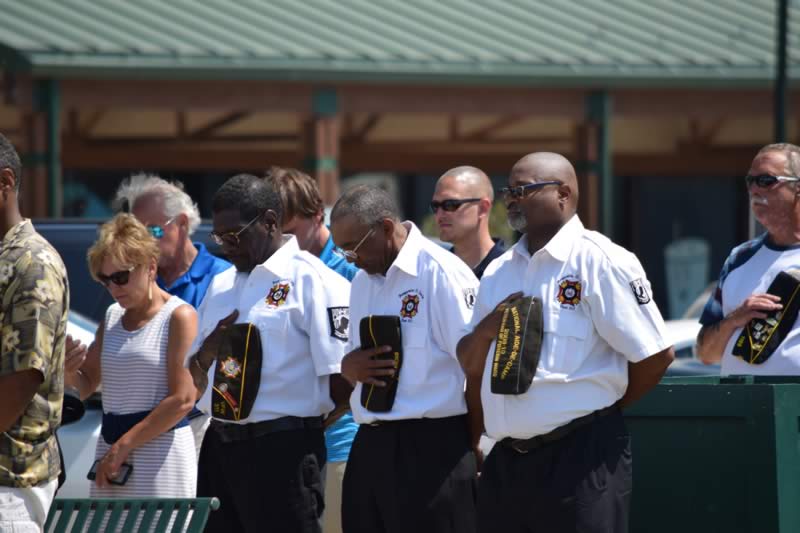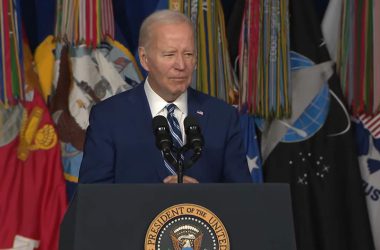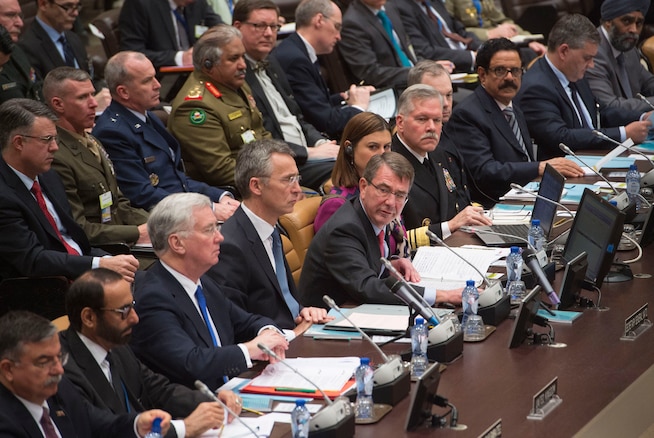Defense Secretary Ash Carter addresses efforts to accelerate the counter-ISIL operation in Iraq and Syria during a meeting he hosted in Brussels, Feb. 11, 2016. During his trip, Carter also attended a NATO defense ministers meeting. DoD photo by Air Force Senior Master Sgt. Adrian Cadiz
BELGIUM–(ENEWSPF)–February 11, 2016
SECRETARY OF DEFENSE ASH CARTER: I just concluded a short while ago a very successful and productive meeting with defense ministers from coalition nations participating in the military campaign against ISIL. So a very good conversation. Before I provide you with an overview of our discussions and what we agreed to, which was very significant, let me give you some context about how we arrived here today.
Since I became secretary of defense, dealing ISIL a lasting defeat has been one of my top priorities, and over the course of the last six months, we’ve taken a number of steps to accelerate our — that is the U.S. — contribution to the campaign and to put ISIL on a trajectory towards a lasting defeat.
Last summer, we decided to consolidate our war command under the leadership of Lieutenant General Sean MacFarland, one of our nation’s foremost military commanders and a veteran of the Iraq war, to ensure that we enhanced our own unity of effort. In the fall, at my, Chairman Dunford and General Austin’s recommendation, President Obama approved a series of accelerants to our military efforts against ISIL, including fielding some of our most elite units and advanced capabilities in Iraq and Syria.
As we implemented these enhancements, we also refined our military campaign plan. Last month, I had the opportunity to preview this campaign plan at Fort Campbell, Kentucky to our troopers from the 101st Airborne Division who are headed to Iraq as well as to some of our core allies in Paris and to Iraqi Prime Minister Abadi. They understand what our campaign seeks to accomplish and know our staunch determination to accelerate ISIL’s defeat.
Today, first, I shared that campaign plan and its operational concept with my fellow defense ministers from throughout the coalition, and am very pleased to report that there was unanimous support for the campaign plan’s objectives as well as for the concept of operations. As a reminder, those objectives are first, to destroy ISIL’s parent tumor in Iraq and Syria; to combat its metasticies worldwide, and to protect all of our homelands.
To accomplish our objective in Iraq and Syria, we have two big arrows pointing in the direction of Mosul and Raqqa where we intend to collapse ISIL’s control over these two cities.
To update my fellow ministers on near-term steps we’re taking to support our partners in their march towards Mosul and Raqqa, I asked General MacFarland, our overall operational commander as I indicated, to join us today and to provide an update on the campaign progress and on the way forward in the coming weeks and months.
Sean has done an absolutely superb job of prosecuting and accelerating the campaign, and the ministers were pleased to have an opportunity to hear from him firsthand.
Now, in addition to the broad endorsement of the campaign plan, which was the first accomplishment we achieved in our meeting today, we also all agreed on the need to accelerate the campaign. This acceleration will, of course, require all members of the coalition to step up, each in their own ways, with additional contributions, another critical outcome of today’s meeting.
For our part, the United States is showing the way forward through intensifying our counter-ISIL operations, and we stand ready, as we’ve made clear, to do more, as our campaign acceleration generates more opportunities. We’re absolutely determined to lead the campaign against ISIL, and I’m grateful to say the United States is not in the fight alone.
Last December, as we stepped up our own efforts, I sent letters to 40 of my counterparts asking their nations to contribute more to the military campaign, and many nations have responded favorably since then.
Core countries, including the Australians, French, Italians, British and Germans have stepped up their already significant contributions. Two additional major contributors to this campaign, the Netherlands and Canada, have announced an expansion of their commitments just in recent days.
The Dutch shared with the coalition just minutes ago that they are now prepared to carry out airstrikes in Syria, in addition to their ongoing air operations in Iraq.
The Canadians agreed on Monday to triple their training effort in northern Iraq and double their intelligence efforts, among other critically important non-military contributions that they’re making in addition to their military contributions.
And since arriving in Brussels earlier this week, and even today, I’ve received additional pledges of further commitments from the Czech Republic, from Poland, from Romania, from Denmark, pending final approval, of course, by their respective governments.
Encouragingly, furthermore, several of the coalition’s Gulf state partners have indicated their willingness to intensify their counter-ISIL activities as well.
Saudi Arabia’s defense minister, for example indicated that the kingdom is reinvigorating its commitment to the coalition air campaign, which is very welcome news, and contributing in other critical ways on the ground.
We also discussed working with the kingdom in their efforts in leading a collection of Islamic nations in the fight against violent extremism, whose efforts will be complementary to our own within the counter-ISIL coalition.
Saudi Arabia and its regional partners have a clear stake in this fight, and I hope its neighbors in the Gulf also intensify their counter-ISIL campaign in the coming days.
And I could go on, but altogether almost 60 percent of military — of the coalition members have — have already decided to increase their contributions to the campaign. An additional third of them have made commitments over the last few days to seek approval for additional contributions from their parliaments.
In sum, nearly 90% of the countries participating in the coalition’s military campaign have stepped up to do more in the last months and days; whether in extending their air operations to Syria; providing additional trainers, critical logistic support or materiel to local partners on the ground; training police; stabilizing; assisting recovery — the coalition is clearly intensifying the counter-ISIL campaign.
I should also mention that, thanks to the leadership of NATO Secretary Jens Stoltenberg, we are now exploring the possibility of NATO joining the coalition as a member itself. This, too, is a significant development.
NATO as a new member would bring unique capabilities that could be brought to bear against ISIL, including experience in building partner capacity, training ground forces and providing stabilization support.
I look forward to discussing NATO’s appropriate role with fellow NATO allies in the days and weeks ahead, and as I indicated this morning, that was discussed this morning, and a path ahead was charted at this morning’s meeting.
And I also indicated this morning what kinds of capabilities NATO brings collectively, over and above what its individual members bring, and therefore how it could, as an organization, also make a separate contribution. That’s very positive.
Now, many of the nations present today are also contributors to the critical non-military aspects of the campaign against ISIL. That’s just as important. We discussed them, as well.
Those are needed capabilities as well, whether helping contain the flow of foreign fighters or financing to ISIL, or in delegitimizing ISIL’s toxic messaging, or in providing stabilization support, these activities are vital tools in the coalition’s arsenal.
In the weeks to come, there will be several opportunities to — for us to follow up on the contributions offered today, and on the — the campaign’s continuing requirements as it marches towards the defeat of ISIL.
Both the Chiefs of Defense Conference later this month and a CENTCOM force generation conference next month present opportunities for partners to assess the effects of their recent commitments, and deliver additional resources.
So I’m very pleased that so many nations have stepped up and answered the call, even in recent days. But my challenge to coalition members to accelerate our military campaign will not end today, any more than America’s resolve to lead and make more contributions itself will end today. It will continue.
Indeed, the constructive dialogue we engaged in here today and the determination my counterparts brought to this ministerial must continue so that we can truly deal ISIL a lasting defeat.
With that, I’m happy to take some questions. Peter?
PETER COOK: We’ll start first with Thomas Watkins of AFP.
Q: Thank you, Mr. Secretary.
In your opening remarks ahead of the meeting today, you said the coalition should see some tangible gains in the coming weeks. I was wondering if you could describe to us what tangible gains, exactly, you envision, and if you really consider this to be a new — critical new phase in the campaign.
And also, I was wondering if you have any reaction to President Erdogan’s comments yesterday about America contributing to a pool of blood by supporting Kurdish fighters in Syria. Thank you.
SEC. CARTER: Well, with respect to the first part of your question, the tangible results of today’s ministerial are, as I outlined, namely the universal or unanimous support for the campaign plan that we have devised, and its — and the operational plan that goes with it, and for the capabilities that will be required.
And then also very substantial new commitments of additional capabilities. And — I’m sorry — and with respect to what happens on the ground as a consequence of those capabilities, is that what your question is?
Q: (off-mic.)
SEC. CARTER: Oh. Well, there’s too much to enumerate. I’ll tell you about some of the ones I can talk about. There are other ones that I can’t talk about.
But we have some new efforts to strike at ISIL’s financing that you’ll see, there are a number of Iraqi units which will rotate out of their training bases and be deployed up north towards Mosul for the attack on Mosul. We are carrying out some important activities in the information area I can’t discuss much further with you. A number of the countries present here — I’m going through others, there’s just a lot going on so I don’t exactly know how to zero in on answering your question, there’s so much going on.
The stabilization of Ramadi is getting started now that most of the downtown is cleared of IEDs, so the beginning of the provision of water and electricity. And so I’m — you know, I’m covering a wide variety of types of contributions in places where they’re happening. But there’s just a great deal going on. Now of course, you know, I’m very — I’m happy to see so much going on, but I — we’re also impatient and we want the pace to accelerate.
With respect to the Turkish government’s comments of, I guess, yesterday afternoon, you know, obviously Turkey is a good and longstanding ally of the United States. We’re not going to agree with them in all matters. We staunchly agree with them and always have that we oppose terrorism in any form. We are working with capable local forces in Syria to defeat ISIL, and we will continue to do that. But we also continue to work very closely with Turkey. Turkey was in the room today, the defense minister obviously made a very strong contribution not only to the discussion but in describing Turkey’s own efforts to accelerate its participation in the coalition, even as the rest of us are doing so.
MR. COOK: Next question, Aaron Mehta, Defense News.
Q: Thank you, sir. You mentioned that Saudi Arabia plans to reinvigorate its air campaign. One of the Saudi officials here also told press that they’re still interested in a ground campaign if they were asked by the coalition. Can you outline exactly what Saudi Arabia said it would be willing to do today, and what you — has the coalition accepted from Saudi Arabia?
And I’m asking this because things like reinvigorate are kind of a nebulous term that we’ve heard used before and then seems to also maybe not —
SEC. CARTER: I’m sorry. Let —
Q: The term reinvigorate has been used before by partners in past cases, and we haven’t seen things necessarily materialize —
SEC. CARTER: Well, I understand. Oh, well, I think in the case — if the — their air contribution and then I’ll get to the ground contribution. Reinvigorate means something very specifically in this case, which is air assets that were — have not been operating in the — as part of our ATO [air tasking order] in the air campaign, and we’re not doing so months ago — begun to do so in the last few weeks. It’s a number of strike aircraft that’s an important contribution, a skilled contribution. So it — in this case — I don’t know what other context that words has been used in, but it kind of means what it says, more aircraft dropping ordinance as part of the coalition ATO
With respect to ground operations, we talked about a wide variety of things, so let me give you the kinds of things that we’ve talked not only to Saudi Arabia about, but other forces — I mean, other coalition contributors here as well.
I mean, first of all, there is training and — of both military forces and police forces. We need forces on the ground that participate in training. Then enabling, including even accompanying partner forces. That’s something that ground forces can do. We obviously talked about, but I’m not going to talk about it here, special forces that have some very special and distinctive capabilities.
And then we also talked about logistics support, sustainment, rebuilding of a kind that is going to have to go on Ramadi. So all of these are activities that coalition partners, to include Saudi Arabia, will participate in, and that whole gamut we discussed today, both in my individual meeting with the defense minister and deputy crown prince and also at the larger meeting where we were all together, the (off-mic.)
Q: Are you convinced the Saudis can wage a two-front war, one in Syria, one in Yemen?
SEC. CARTER: Yeah. I mean, I don’t think they really wish to be doing that any more than anybody else would wish to be doing that, but if you’re first talking about capability, they are importantly — and here we helped them very steadily to defend themselves and Saudi territory against attacks. So that part we’re very familiar with because that’s the part that we share with them because we have a longstanding commitment to Saudi, the territorial integrity of Saudi Arabia. And they have indicated a willingness to put the resources also into the counter-ISIL fight.
At the same time — I can’t speak for them, but certainly we wish on their regard and we wish on everybody’s regard in Yemen that things would wind down there because it’s not good for the population of Yemen, and that situation needs to be settled so that people aren’t fighting there.
MR. COOK: Jonathan Beale with BBC.
Q: Thank you, sir. Just on the Saudi question, I mean, is it right then that you, beyond special forces, you were not looking for a large boots-on-the-ground contribution to take the fight to IS because that might not be a good idea.
SEC. CARTER: I understand the question. That is not for any of us in the coalition, individually or collectively, our strategic approach. Let me just remind you of that, and that was discussed at the meeting. Our strategic approach as a coalition, and the one that makes sense for all of us, is to enable capable and motivated local forces to take and hold territory out of the simple recognition that at the end of the day, territory retaken from ISIL has to be occupied and governed by people who are from that area and want to live there.
So our whole strategic approach, collectively and individually, is to enable capable and motivated local forces, and that strategic principle was in fact discussed today.
Q: I just wanted to follow up quickly, sorry, on — on Libya. You didn’t mention Libya by name, but I just wondered — how long can you sort of sit on the sidelines —
SEC. CARTER: Libya was discussed.
Q: — okay, but how long can you sit on the sidelines and do nothing about the chaos that’s descended on Libya because of IS?
SEC. CARTER: We discussed Libya today. The discussion was led by the Italian defense minister, and — and the activity there, aimed at bringing the Libyan parties together, to resolve their differences so that they can, having done that, do something that all Libyans agree about, which is they don’t want foreigners on their territory, milking their population, stealing their oil income and so forth.
We stand ready — and of course, Italy has indicated it would take the lead in that regard, and Italy’s done a lot of planning in that regard, and — and reported on its planning. The United States has participated in that. The United States and other coalition partners have pledged their support for such an operation.
And in the meantime, of course, people are doing what they need to do to protect themselves from a counterterrorism point of view, and the United States has done that, and others have done that.
So that’s — but it was discussed — an important subject to discuss, because — important as defeating ISIL — what I’ve called its parent tumor of the cancer in Syria and Iraq, it’s important to get at the metastases as well. Nobody wants to see Libya on a glide slope to the kind of situation that already engulfed Syria and Iraq.
MR. COOK: Got time for one more. Wassim Ibrahim from As-Safir?
Q: Yes, of course. And I am from As-Safir Newspaper.
Secretary, I would like to ask you, is it in principle possible for the coalition to send or plans to send ground troops to fight ISIL in Syria without coordination with Russia, especially considering the high risk linked to the — what you called irresponsible heavy Russian activities there? Even troops to train, or special troops?
SEC. CARTER: Okay, well —
Q: And — and linked to this, if I may –the NATO secretary-general described the Russian significant build-up in Syria and the Eastern Mediterranean as a factor changing the strategical balance. So is it a strategic build-up and not a tactical build-up? So what is your strategic response?
SEC. CARTER: Okay. With respect to — we have a channel to the Russian military in which we guarantee that our military activities are not in conflict with one another, and that our forces don’t come into contact with one another.
That’s a channel that is working. It’s — one of the people in this room is the U.S. side of that channel. Now, in — the United States and partners on the ground, in coordination with other countries in the region, are working with forces that are fighting ISIL.
Sadly, and in answer to the second part of your question, that’s what the Russians said they were going to do, and it’s not what they’re doing. The Russians have overwhelmingly, in their — particularly their airstrikes — struck targets that are not ISIL targets.
Instead, they have become a participant in the civil war in Syria, which needs to end, by backing the regime and fueling the civil war.
To get your point about what’s going on in recent days, I mean, I think the most tragic thing — consequence of Russian actions at the moment is the movement of a large number of people — very cruel movement of a large number of people in Syria.
I have said before, and this hasn’t changed at all — this is a strategic mistake by the Russians that we don’t intend to coordinate with or take any part in, and we are determined, in our campaign to defeat ISIL militarily — and we’ll do that. I’m confident we’ll do that. The Russians are not helping in that regard, but we’ll do it anyway.
And as far as the Syrian Civil War is concerned, they’re taking it in the wrong direction. We continue to want to take it in the right direction: namely, one in which there is a political transition that provides a government for the Syrian people in the future that does not have Bashar Assad as part of it, does sustain the structures of the Syrian government, and therefore order and structure, but include moderate opposition of, by the way, the very kind that Russian activity either directly attacks or undermines by fueling extremism. That’s the effect of their actions.
MR. COOK: Thank you very much, everyone.
SEC. CARTER: Thank you all very much.
Source: http://www.defense.gov









